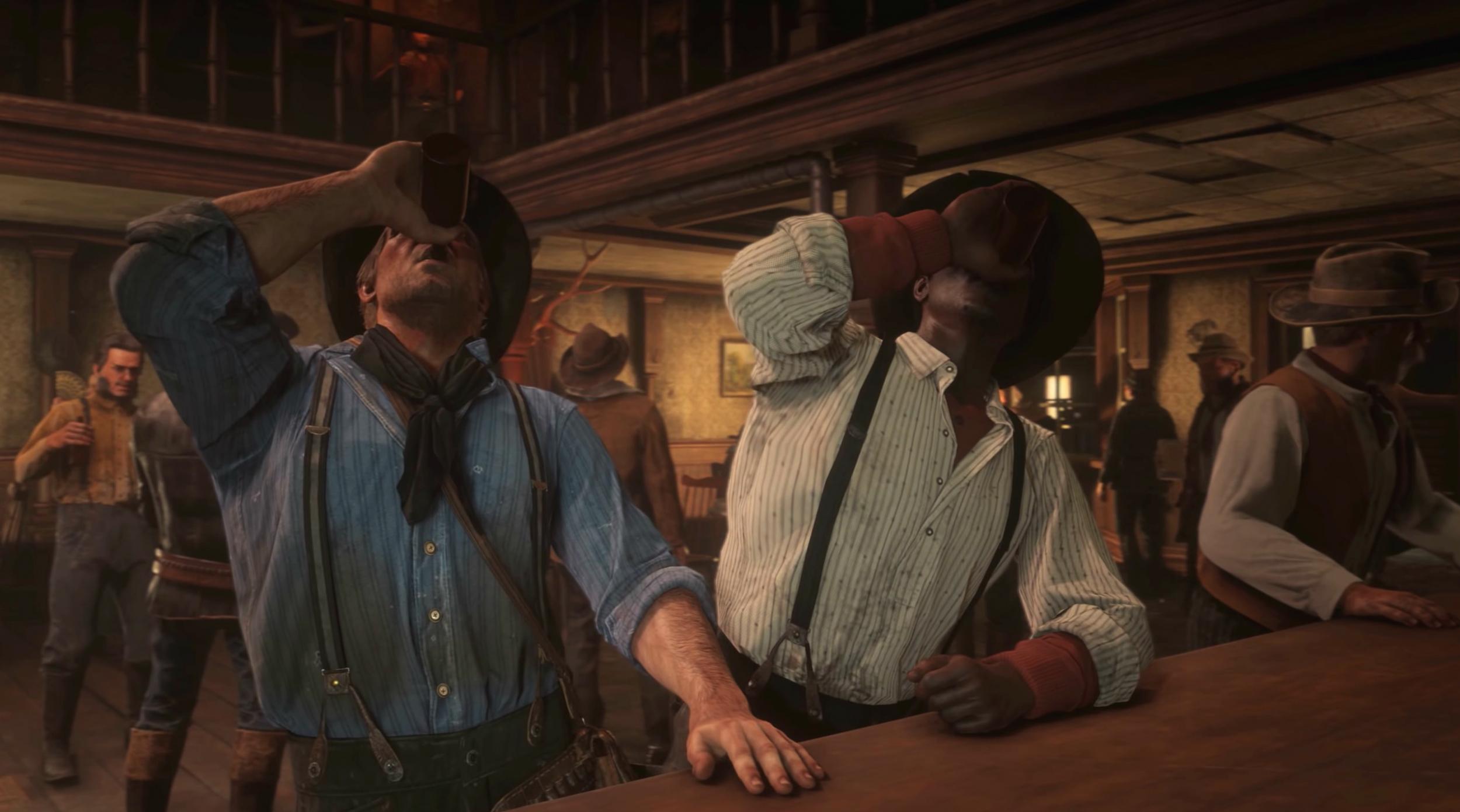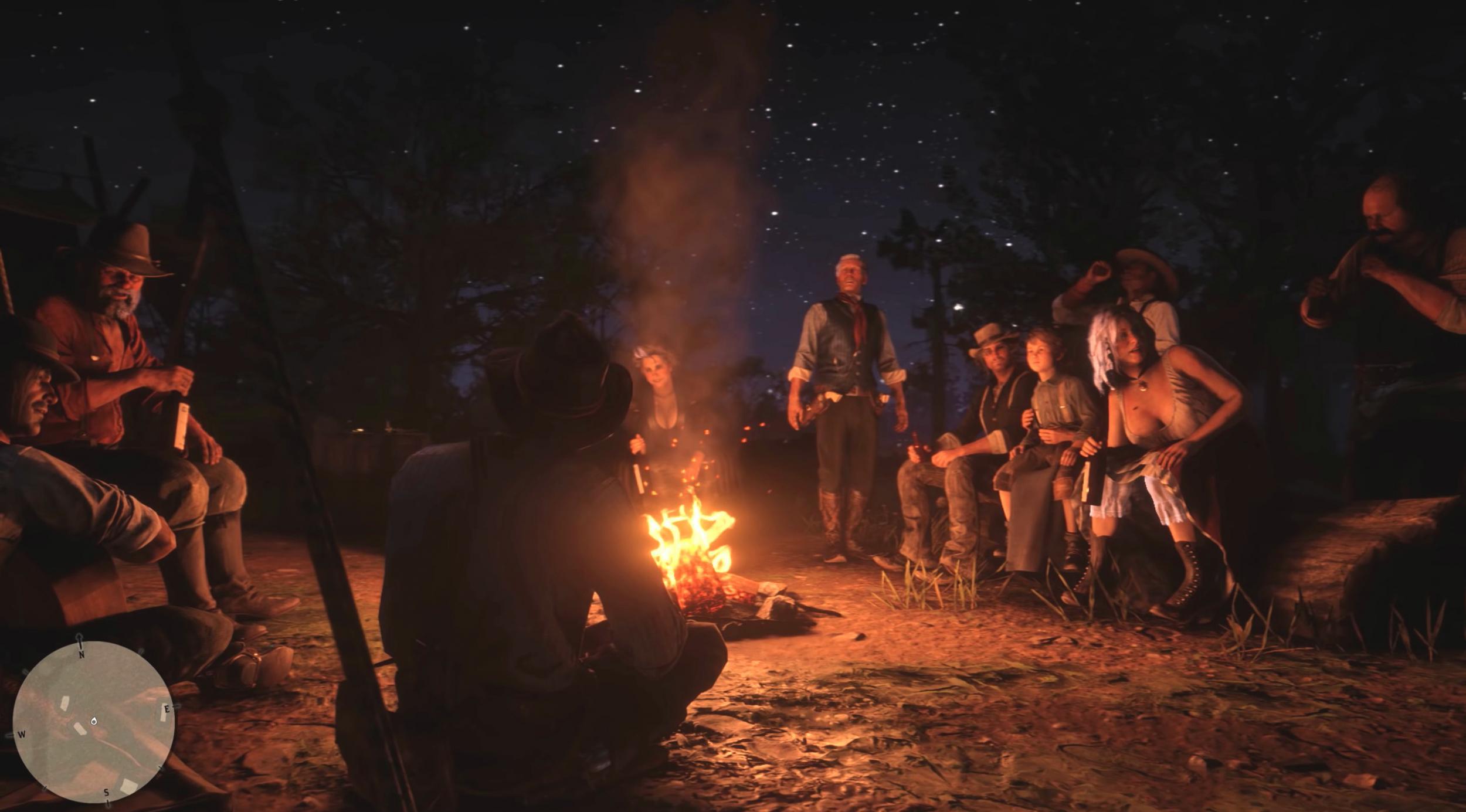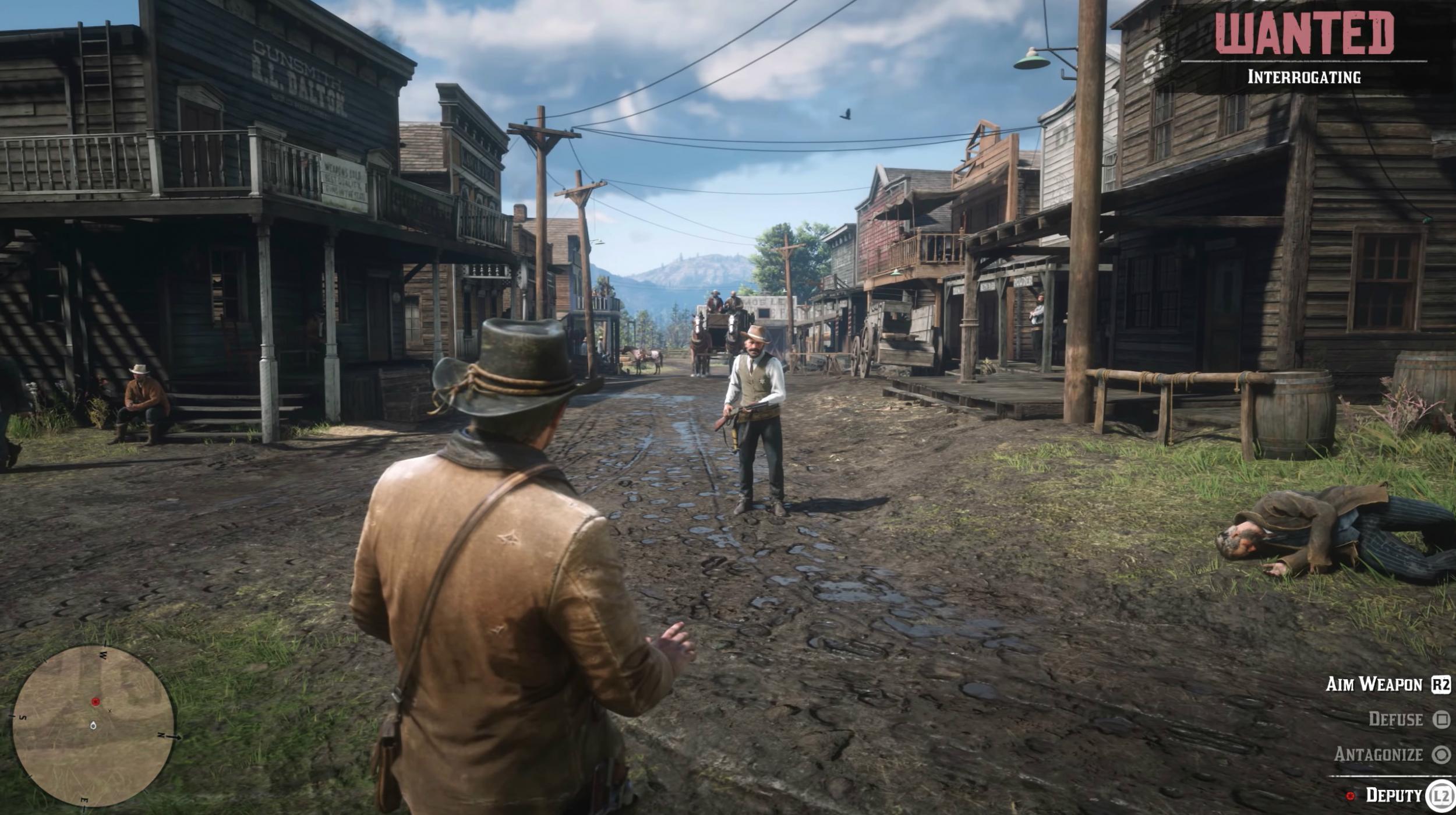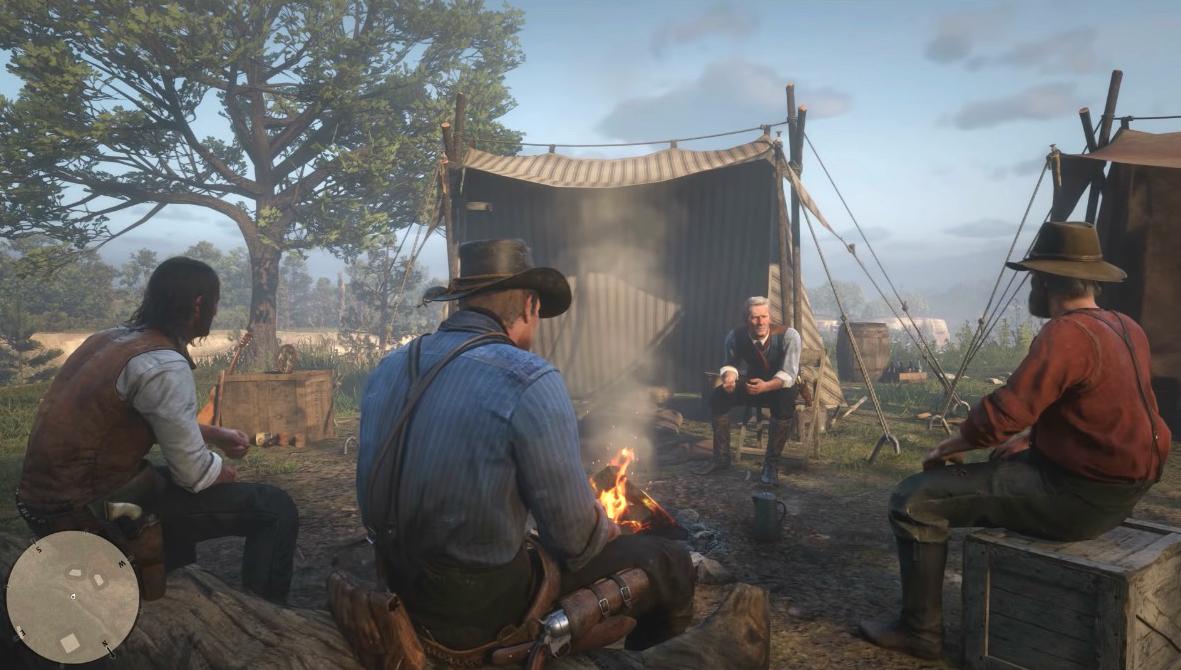Red Dead Redemption 2 first play review: This game is alive - here's what we learned from a couple of hours spent with it
If this preview was anything to go by, Rockstar's latest creation will be a gaming experience to treasure
I only want to talk – honest – but the first two humans I encounter in Red Dead Redemption II want nothing to do with me, promptly rearing their horses and riding in the opposite direction. Was it the freshly skinned deer, grotesquely slumped over the back of my horse, that put them off? Or rather had they failed to spot the carcass and were concerned as to the origin of the pool of blood on the dirt track in front of me? Perhaps they just didn’t like the cut of my jib?
Rockstar’s latest title is alive like no other game before it. It remembers. Your actions have consequences. If you start a fight in a saloon after too much moonshine one night, don’t expect to be greeted by the barman with a “so what it’ll be?” the next day (or in a week or two for that matter) but rather a “we don’t want no more trouble, y’hear?” And that’s if you’re lucky; depending on his personality he might choose to reprimand you much more aggressively.
The massive overhaul of the NPCs and the player’s interactions with them is one of the most striking elements of Red Dead Redemption II, which represents not only a seismic improvement on the original Western game but a leap ahead of Rockstar’s most recent project, Grand Theft Auto V.

It’s not the first thing that jumped out at me, though, as I was handed the controller and dropped as protagonist Arthur Morgan into a hilly environment somewhere in 1890s America. It was the graphics. The texture and detail of the environment is absolutely breathtaking. There’s a real vividness to it, a depth of colour that defies the usual stylistic use of brown in Westerns, and I spend a good few seconds just rotating the camera and taking it all in.
I’m particularly distracted by the weather, perhaps because it’s often an afterthought in games. In RDR2 the sky is not just bright, then dim, then dark; rainy and then sunny. Its ever-changing, and rendered with unprecedented verisimilitude. Cloud patterns form and disperse, mist hangs heavy in a valley, wind uproots the brush and sends bits of leaf flying past you. It’s staggering just how much of a difference this all makes to the atmosphere and palpability of the game.
The lighting is another element improved so significantly that you realise how comparatively flat it’s been in gaming until now. In the film Barry Lyndon, Stanley Kubrick exclusively used natural light – characters being illuminated conspiratorially by candelabras. There’s a similar vibe to RDR2 as I step inside a train carriage once night has fallen, the light being localised to its source, creating pools of it that bounce off Morgan and form shadows as I roam the carriage searching for loot.

My two hours with the game were supposed to be centred around a specific mission. I get there eventually, but it’s too easy to get distracted, which is exactly what you want from an open-world title.
I set a waypoint to where the mission is initiated, but along the trail find a woman crushed by her horse who needs pulling out from under the animal and riding back to town. A bounty from a local sheriff for a doctor selling questionable medicine also steals my attention, while a quiet, seemingly empty ranch house proves just too tempting not to explore. Unsurprisingly, the homeowner isn’t too happy when I just stride through his front door, and my attempts to defuse the situation fall on deaf ears, leading to a brawl in his kitchen. Apparently I’m not too virtuous a gamer to beat a fairly aged man unconscious, but I draw the line at his cute, albeit very much snarling, dog. I fire a warning shot in the air and try and get the pooch to shoo, but my fondness for a virtual animal proves foolish when it proceeds to rip my throat out.
Later, I get a glimpse of one of the game’s cities, which I’m not allowed to tell you about but oh boy. Chills.

Some observations on various gameplay elements
Camp life
Though knowledge of the first game’s narrative isn’t at all vital, RDR2 is a prequel and our new protagonist, Arthur Morgan, is part of the Van der Linde gang, a band of outlaws who have served as essentially his surrogate fathers since he was a kid. They’re a close-knit bunch and based at a camp which is established in different parts of the map throughout the game, serving as a little cultural hub. The camp needs money, food and supplies to survive and is far more than just a “press X to sleep” location. Certain missions and skirmishes may arise from a visit to camp; it’s a place you can grab a quick shave (though it won’t be of the quality of a professional cut in town); and it’s a home where you can sit around the campfire and trade stories. If the mood takes them, a fellow gang member might even suggest you ride into a nearby town for a drink from time to time.
I’m assured that tending to the camp isn’t compulsory and won’t hinder your advancement in the game, but it can lead to upgrades and other hidden benefits. More than that, for a certain type of gamer who doesn’t just want to blast everything that moves, all this quotidian stuff – the minutiae of being a cowboy – might actually prove the most alluring, absorbing part of the game.
Interactions
“Walk by or shoot dead” have generally been the two options when it comes to interacting with NPCs in games. Here though, you might choose to greet a passer-by and try and learn something from them, or intimidate them and ultimately hold them up. Sometimes your restraint will be rewarded, sometimes you’ll regret not giving them both barrels while you had the chance. The way conversations go down will change from person to person; a farmer, for instance, will react to you very differently than a sheriff. These branching interactions also come into play with your horse, along with dogs who you might choose to praise or scold.

Weaponry
The first thing to note here is the sound and visual design on the gunfire. Bullets depart the barrel of a gun with a bass-y thump and are often accompanied with a few sparks, which all serves to highlight just what a major action the shooting of a gun is, and may cause you to think more carefully about when you choose to employ it.
Weapons are open to an insane level of customisation; rifles can have their metal types swapped, handles added and removed, and even be engraved. They also must be cleaned regularly and will degrade through use, meaning they’ll need repair. Again, this might deter you from just pumping lead at every opportunity.
Your horse (as a major character)
A lot of the advancements in RDR2 seem to be about not letting the player just take necessities as a given. Your horse is not a vehicle but a living thing, and as such it will require grooming, feeding, and calming when it gets scared. Certain horses will be faster than others, yes, but also more or less comfortable on certain types of terrain and liable to react differently to gunfire. Your patience will be rewarded, as horses are vital in the game not only for getting you from A to B but for carrying weapons, items, people and the spoils of your hunts.
I’m the kind of gamer who enjoys this realism, but it is a bit of a gamble for Rockstar. Horses going immediately from standing to full gallop in games is obviously unrealistic, but it just makes life easier. The process of slowly gaining speed on your horse in RDR2 is something I can see irking less patient players, but it’s a minor gripe.

Honour
This is a branching of experience in the most macro sense and not something I could get a feel for in a couple of hours, but worth mentioning as there were hints of it during my session. A spectrum of morality is possible in RDR2, and what kind of a man you choose to be in the game will affect how it plays out. Not in the sense that you will be locked out of any missions, but in terms of how other people in the game treat you.
Conclusions
Even after just tipping a toe in Red Dead Redemption II‘s swamps it’s clear this is something very special. Rockstar has created not so much an open-world game as an open-life one, where you live as your character. The gap between game and gamer has never felt so thin. Whether RDR2’s story, missions and over-arching emotional impact can live up to the gameplay is a matter for the full review on launch day, but these were about the most enjoyable two hours spent in a game I can imagine. I’m already thirsty for many more.
Red Dead Redemption II is released on Xbox One and PlayStation 4 on 26 October
Bookmark popover
Removed from bookmarks